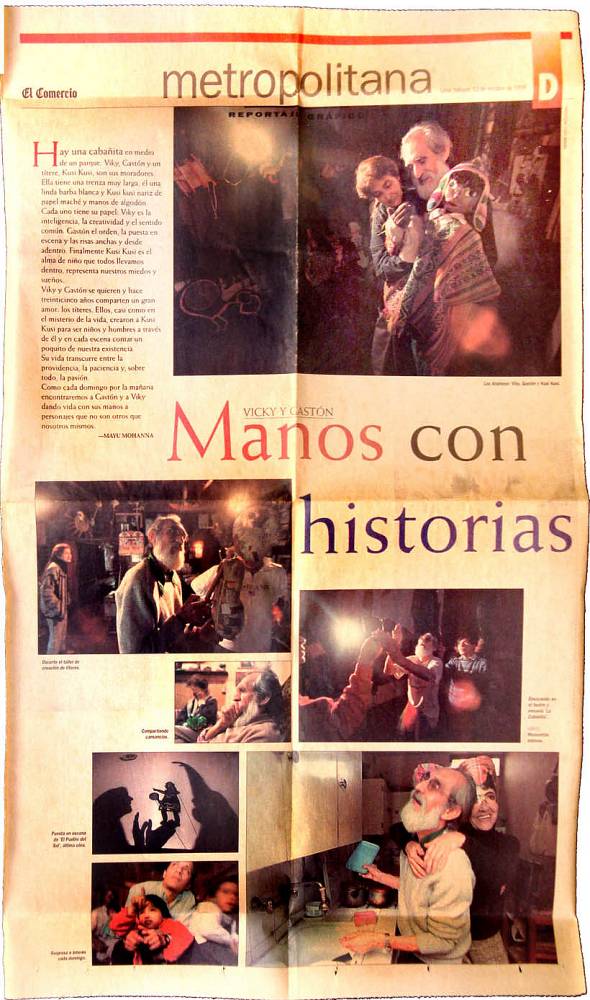Kusi Kusi: Identity as a (regrettable) ‘State affair’
A recognized puppet theater from Lima, multi-award winning internationally, active for half a century, is claiming against Channel 7 TV Perust for usurping their brand.

Featured Contribution
- Comments:
- 0
- Votes:
- 2
- ES
In design, the concept «Identity» is one of the most important principles to build, positioning and protecting – if not the most important – both referred to a company, a service or a product. Identity – also usually referred as the trademark – is a value in itself and is constituted by a multiplicity of specific attributes or evoked, tangible and intangible, that give power of recognition and ability to stand out between the other individual or collective identities in the society in which it should play. This basic principle is a substantial part of the educational programme of any initial level student of design in all its variants, marketing and/or communication. It is pointless to say that it is known – or it must be known – by professionals of any such activities. Not to mention the TV channels managers.
This Identity is built, defined and long ago established in the case of Puppet Theatre and Workshop «Kusi Kusi» with its unbroken career of fifty, always under the loving guidance of their creators: Victoria –Vicky – Morales and Gastón Aramayo (she is an overwhelming Arequipean and he is a more cautious Bolivian from Potosi), a beautiful couple in art and in life, that in such cases, it is almost the same. The «Kusi Kusi» have been deserved tributes and accolades for his work in various parts of the world and even officially and in particular from the Peruvian State itself.1
Given his background, is explained widespread amazement after a reprehensible action by Channel 7 TV Peru,that in 2013 misappropriated the phonetic Identity of «Kusi Kusi» to designate a childrenʼs programming channel segment. Note that the Identity to which this article refers is solely the name «Kusi Kusi», it is not about the visual configuration – what we call logotype or visual identity – that is not in dispute.
The situation could not be more unfair and incomprehensible: the Peruvian government, through the own official medium Channel 7 TV Peru under the Prime Minister of Peru (medium in which the «Kusi Kusi» were repeatedly invited required by their art for interviews and TV shows – appropriates deliberately and blatantly the Identity of this legendary company of puppeteers still active in Lima.
Without the consent of the «Kusi Kusi», TV Channel 7 Peru had planned perversely make the official trademark registration, foreseeing that «Kusi Kusi» originals would not have done, as often happens in 99.9% of Identity cases of small puppet companies from anywhere in the world.
Fortunately, all is not reducible to bureaucratic formalities: the «Universal Declaration of Human Rights», of which Peru is a signatory, in Article 27, paragraph 2, states:
«Everyone has the right to the protection of the moral and material interests resulting from any scientific, literary or artistic production of which he is the author.»2
The clonned «Kusi Kusi»
The children segment with usurped Identity was a «precooked» material that Channel 7 TV Peru bought to Argentina as part of childrenʼs programming Argentinian state channel «Paka Paka». To adapt it to the Peruvian market some details were added or adjusted, Identity between them surely replaced by the usurped one. It is not known who is the «re-creator» of that Identity, if Argentinian production company that made «Paka Paka» or Channel 7 TV Peru. What is positively known is that officials at all levels of the Prime Ministerʼs Office and Channel 7 TV Peru could not ignore that a glory of their country, such as the Puppet Theatre and Workshop «Kusi Kusi» existed for half a century with that same Identity. And with that knowledge, which would have corresponded, was ask for the immediate change of that Identity, given that it affected illustrious countrymen that by the same circumstances should deserve, at least, respect.
From a strictly professional point of view, no one understands, if not by way of bureaucratic stupidity, the reason behind the stubbornness with the usurped Identity, since instead of misappropriating someone elseʼs Identity, if what they sought was something like «Paka Paka» cacophony – which means nothing and is just a nonsense and even if they were obstinated with that identity also must contain a «k», they could have used «Piki Piki», «Tuki Tuki» or any similar play of words with identical phonetic cadence. There are hundreds of possible naming variants, keeping the number of letters, the obsessive «k» and the musicality of the words; thus they could have reached an own variant similar to the pretended, without usurping othersʼ identity or harming anyone in the process. That would have been an ethically responsible professional work. But for that we must think creatively, not bureaucratically.
But it would be advisable not to be naive. In light of the events, it is reasonable to conjecture that the decision to appropriate the name of another was not neither casual nor innocent: what they wanted was to appropriate through the usurped identity of all the positive attributes of «Kusi Kusi» original, treasured in the mythical lost paradise of childhood, present in the collective unconscious of several generations of Peruvians who attended, have seen interviews or told them stories of those lovely puppeteers. An act of usurpation by which, instead of building an own identity from own communication strategies too, with work and dedication that such a decision would have involved, they simply decided to «vampirize" an already renowned pre-existing, excellent and efficient identity. A scarcely honorable action, worthy of officials without too many scruples.
The original «Kusi Kusi».

«Kusi Kus» means «Joy Joy» in Quechua. Thus we read in countless press releases and texts generated by Vicky Morales and Gastón Aramayo since many years. So, it was outrageous to see the same explanation in the conceptual foundation that integrated the logo presentation for childrenʼs segment of Channel 7 TV Peru with the usurped identity at the project launching.
The authentic «Kusi Kusi» patiently kneaded its identity with love for children and respect and dignity to exercise their art. They does not owe their reputation to anyone nor have took advantage from anyone to build it; they alone and their illusions of emotionʼs conjurers, driving the rods, gloves and strings of their puppets, have been built a genuine identity, solid and ethereal at the same time. These values have been offended by the usurpers. The karma of those opportunists, is that in his own infamy lies his ignominious punishment. Perhaps they or their children have been audience for shows of these dream manufacturers, like the «Kusi Kusi» are... Would they be able to brag front of their children of such a «feat»?
Boost your career
Don’t just stop at reading. Discover our updating and specialization programs to take your professional profile to the next level.
View Academic OfferShare
Please value the editorial work by using these links instead of reproducing this content on another site.

- «El Peruano» (Official Gazette of Peru, published in Spanish), Volume XXIX No. 1174 - Lima, Friday 30 March 2012. Ministerial Resolution No. 113-2012-MC, Lima, March 27, 2012. Item «Culture», pp 463351 and 463352: «Granted distinction» of «Personality Merit of Culture» to different people. – María Victoria Morales de Aramayo, recognition of his untiring vocation to offer creativity, quality and sensitivity to puppet theater through the Company Kusi Kusi Puppet Theatre. – Gastón Aramayo Silva, recognition of his untiring vocation to offer creativity, quality and sensitivity to puppet theater through the Company Kusi Kusi Puppet Theatre Theatre.
- «Universal Declaration of Human Rights.»
References
- Header illustration: The little Peruvian cholo «Kusi Kusi», eponym of the group, with his pet dog «Butter». Promotional Poster,1994.
- Kusi Kusi on Facebook.
- Kusi Kusi Website.
- Petition on change.
Topics covered in this article
What do you think?
Your perspective is valuable. Share your opinion with the community in the discussion.
Comment now!


